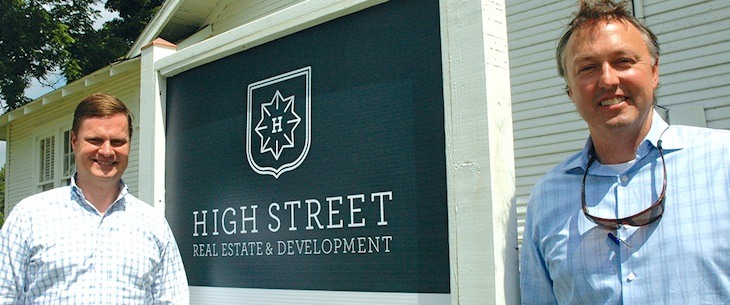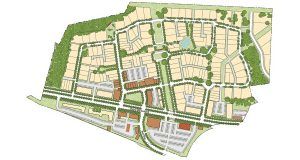High Street ‘New Urbanism’ positions Johnson for development spotlight
by July 9, 2017 7:19 pm 2,319 views

Ward Davis, left, and Morgan Hooker are the founding members of High Street Real Estate and Development in Springdale.
Nearly three years after the completion of a major road project, a new but experienced real estate group is positioning the tiny community of Johnson for its turn in Northwest Arkansas’ development spotlight.
Infrastructure work has started on Johnson Square, a 74-acre development valued at approximately $200 million and situated mostly to the north of Johnson Mill Boulevard.
The men behind the idea are Ward Davis, Morgan Hooker, Bob Hill and Gerald Johnston. Davis, Hooker and Johnston are the owners of newly formed High Street Real Estate and Development, in charge of marketing the property to potential tenants, both residential and commercial. Johnston and Hill, who is a broker for the company, own the land.
Together, they want to develop a community envisioned as being an economic catalyst for Johnson, the sleepy town with a population of 3,639 situated between the two largest cities in Northwest Arkansas — Springdale to the north and Fayetteville to the south.
The design is called New Urbanism, and Davis explained that it’s an idea where a connected network of streets can accommodate pedestrians, cars and bicycles, along with places for people to get together, eat and shop in one location.
“If we can accomplish the game plan as it’s prepared, it could really be something special for Johnson, and for the area, for that matter,” said Johnston, a former CFO of Tyson Foods who retired in 1996 after 26 years. He remains involved in the regional business community, though, as an active real estate investor and developer. “It’s really exciting to think I can be part of that. I think we’ve put a pretty good team together.”
PUTTING ‘THE BONES IN PLACE’
The game plan, according to Davis and Hooker, is this: develop a pedestrian-oriented neighborhood that blends office, retail and restaurant space with multiple residential options of houses, townhomes and cottages. The center will be the square itself, situated at the intersection of Johnson Mill Boulevard and Main Drive.
“We’re pleased to see the early stages of Johnson Square being built and the design work coming together,” Hooker said. “More importantly, we look forward to seeing the residents, business owners and visitors to Johnson Square come together. We can put the bones in place, but it’s the neighbors who will make it a neighborhood.”

Chambers Bank is providing initial financing with a two-year construction loan of $3.3 million. Construction will take place in three phases and take several years to build out.
Davis said the exact composition of the neighborhood is not set in stone, but Johnson Square will eventually offer around 150,000 square feet of restaurant, retail and office space, a wide variety of apartment options and 200 single-family homes ranging in design and size (from 1,000 to more than 5,000 square feet). In fact, Davis said High Street is working with nearly 10 different architects and designers to create a certain diversity in Johnson Square.
“Different architects see different things,” he said. “And we’ve spent just as much time on the spaces between the buildings as the buildings themselves. The parks, green spaces and everywhere will people will congregate.”
The goal for the final six months of 2017, Ward said, is to complete the infrastructure work and start construction on three of the multi-use buildings. The first building is approximately 21,000 square feet and was developed in partnership with Fayetteville-based law firm RMP (Reece Moore Pendergraft). The three-story building will offer retail spaces including a restaurant, coffee bar and small grocery store on the ground floor. RMP, which also has an office in Bentonville, will occupy the remaining two floors.
Phase I will also include construction of 20 houses, six townhomes and 14 cottages.
JOHNSON NATIVE
The nearly $10 million Johnson Mill Boulevard opened in August 2014 east of Interstate 49. The road — a three-lane connecting the interstate from Exit 69 to Johnson Road and leading to the Tyson Foods Inc. headquarters — has made the area much more appealing for investors. Easy access to the interstate is also a drawing card.
Johnston and Hill, a longtime Washington County developer, acquired their land in separate deals over the past decade, then folded in together in the run-up to launching Johnson Square. Hill’s previous company — R.H. Hill Properties LLC — consolidated with High Street in May. The High Street offices are in a refurnished house built in the 1930s at the northwest corner of Johnson Mill Boulevard and Carley Road.
It’s the house Hill grew up in. The bedroom he had as a boy is now his office.
“I grew up in Johnson,” Hill said. “I can remember when all the roads in Johnson were dirt, you could buy a coke for a nickel at the Johnson General Store, and the mill [now Inn at the Mill] was still grinding corn. We were in the country. Now our real estate company is using the house I grew up in as our office, and we think our neighborhood is the best location in Northwest Arkansas. To be a part of that change is really cool.”
Johnston said the new road was a critical factor in rethinking the development plan for his property.
“Things took a different turn once the road went through,” he recalled. “Starting off, we were just thinking of selling pieces of property individually. We didn’t really have a grand plan. We got approached by Morgan in that process, but even then it was just loose conversations.”
The talking grew more serious when Hooker introduced Johnston to Davis. At the time, he was the CEO of The Village at Hendrix in Conway, a 112-acre traditional neighborhood development in Conway, in the same mold as Johnson Square. He resigned that job in January 2016 to focus on Johnson Square.
Davis, who is president of National Town Builders Association, spent six years leading the Village development from a “calculated risk” into an “outstanding and influential success.” Johnston saw the same.
“We saw what had been done there, and it was similar to some things we were talking about here,” he said. “All this stuff just made sense to me that we had a perfect location. Ward had a lot of knowledge.”
Johnston said the city of Johnson has been “nothing but supportive” in its response to Johnson Square. That’s also aided his enthusiasm for the project.
“It’s not a situation where I feel like I have to fight for it,” he said. “If I had to do that or if it was something the city wasn’t really wanting, then I wouldn’t do it. The fact they see the potential for it to be something they can be very proud of is really good.”
